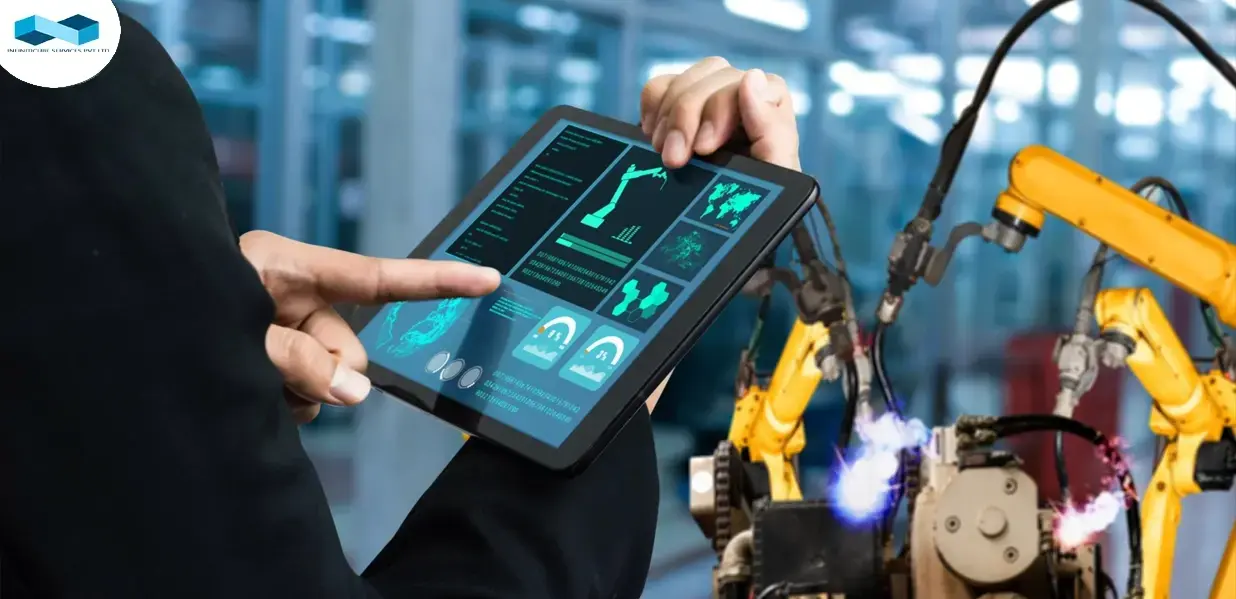


 March 26, 2024
March 26, 2024
 1
1
“Industry 4.0” was publicly introduced in the year 2011 at the Hannover Fair. It originated in 2011 from a project in the high-tech strategy of the German government, which promotes the computerization of manufacturing. Organizations adopting Industry 4.0 are more flexible, responsive, and intelligent and, therefore more prepared for data-driven decisions.
[Source]
Incorporating advanced technology like smart sensors in Industry 4.0 technologies can enhance automation and sustainability. Not only that, but it reduces costs through real-time output tracking and improved capability to monitor automated control systems. And organizations continued to leverage it to enhance their overall manufacturing and operations.
As per the reports of Precedence Research, in 2022, the global market for smart sensors was valued at USD 38.97 billion. The projections of the report indicated the market to soar to approximately USD 231.04 billion by 2032. The predicted market demonstrates an impressive compound annual growth rate (CAGR) of 19.48% from 2023 to 2032.
The smart sensor market's growth is driven by several factors, including
| Report Coverage | Details |
| Market Size in 2023 | USD 46.56 Billion |
| Market Size by 2032 | USD 231.04 Billion |
| Growth Rate from 2023 to 2032 | CAGR of 19.48% |
| Largest Market | Asia Pacific |
| Fastest Growing Market | North America |
| Base Year | 2022 |
| Forecast Period | 2023 to 2032 |
Key Takeaways
[Source]
Understanding the importance of smart sensors in Industry 4.0 and delving into how they are facilitating growth and innovation within the industry, is all this blog is about. Let’s begin with understanding them.
Also Read: Exploring IoT Sensors: Types and Applications
Smart sensors are advanced devices that not only capture information from their environment but also process, analyze, and communicate this data effectively. This makes them invaluable in automation, improving efficiency, and enhancing decision-making processes in real-time applications.
Smart sensors are crucial for Industry 4.0, merging advanced tech with data analytics. They adhere to four core design principles for optimal performance in industrial settings:
Whereas, Industry 4.0 marks the fourth industrial revolution, characterized by smart technology and digital transformation. This era brings advanced automation, data exchange, and manufacturing technologies together, creating highly efficient and interconnected industrial operations.
The four core design principles of Industry 4.0 revolutionize industrial operations, fostering enhanced connectivity, efficiency, and autonomy within the manufacturing realm. They include:
Industry 4.0 marks the evolution of manufacturing from physical labor and mechanical processes to digitalization. After moving from steam power to electrical energy, and then to the computerization of machinery, we're now entering an era where data drives the optimization and enhancement of manufacturing processes.
Industrial smart sensors are pivotal to the Industry 4.0 revolution. These sensors collect data, analyze it to identify trends, and emit signals that prompt necessary actions. Their core applications include:
The true power of industrial smart sensors lies in the collective analysis of the data they gather. A Computerized Maintenance Management System (CMMS) leverages data from multiple sensors to monitor the overall health of machines. This holistic approach contrasts with traditional methods that focus on singular machine points.
Artificial Intelligence (AI) is increasingly vital in analyzing complex data sets. AI algorithms can detect patterns and trends that are not apparent to human analysts. This advanced insight enables managers to implement predictive maintenance strategies, scheduling repairs and part replacements precisely before potential failures. As a result, Overall Equipment Effectiveness (OEE) is significantly improved, leading to more reliable and efficient manufacturing operations.
Manufacturing Sector
Agriculture Sector
Healthcare Sector
Energy Sector
Transportation and Logistics
Also Read: Benefits of Implementing IoT Technology in Smart Banking And Finance
In the realm of Industry 4.0, smart sensors play a pivotal role. These devices gather critical data, enabling automated systems to make intelligent decisions. Let's explore five key types of smart sensors revolutionizing industries.
Temperature Sensors
This sensor is crucial for maintaining optimal conditions in manufacturing processes. They provide real-time data to ensure machinery operates within safe temperatures, preventing overheating and ensuring product quality. This precise temperature monitoring leads to improved efficiency and safety.
Pressure Sensors
It monitors and controls the pressure in pipes and tanks, vital for industries like oil and gas, pharmaceuticals, and food processing. They help maintain system efficiency, prevent leaks, and ensure product consistency by providing accurate pressure readings.
Level Sensors
It keeps tabs on the amount of materials in tanks and silos, essential for inventory management and quality control. Whether it's monitoring liquids, powders, or solids, these sensors ensure that processes run smoothly without interruptions or overflows, optimizing production and storage.
Flow Sensors
It measures the rate of fluid or gas moving through a system. They are key in water treatment, chemical manufacturing, and HVAC systems, ensuring accurate flow rates for proper mixing, chemical reactions, and environmental control. This precise control aids in resource conservation and process efficiency.
Proximity Sensors
It detects the presence or absence of objects without physical contact, crucial for automation and safety in manufacturing. They guide robotic arms, manage material handling systems, and enhance safety by detecting when humans are too close to dangerous machinery.
Also Read: IoT Innovation For Construction Technology and Automation
IoT Integration
AI-driven Sensors
Energy-Efficient Designs
Enhanced Connectivity Options
Improved Sensor Accuracy and Sensitivity
Also Read: IoT and Blockchain: Exploring the Synergy to Revolutionize the Future
Smart sensors are at the heart of Industry 4.0, acting as the cornerstone for the transformation into smarter, more efficient operations. These advanced devices are pivotal in collecting and analyzing data in real-time. It enables automated systems to make informed decisions, optimize processes, and predict maintenance needs. Their integration across various sectors, from manufacturing to logistics, underscores their indispensability in enhancing productivity, sustainability, and safety.
With various advancements in businesses, we can say they are standing on the brink of a technological revolution that promises not only to enhance operational efficiency but also to open new avenues for innovation and growth. Investing in smart sensor technology is no longer an option but a necessity for staying competitive.
Hence, if your business looking to enhance your business operations, productivity, and sustainability, implement smart sensors. Infiniticube Services leverages cutting-edge smart sensor technologies to boost industry productivity and sustainability.
By integrating intelligent sensors, we enable real-time monitoring and data analysis, optimizing operations for efficiency and reducing environmental impact. Our tailored solutions ensure businesses stay competitive in the digital era, harnessing the power of IoT to drive innovation and growth. Contact Us and take your first step. You can also schedule a call with our expert to discuss your requirements in brief.

Hello there! I'm Jayesh Chaubey, a passionate and dedicated content writer at Infiniticube Services, with a flair for crafting compelling stories and engaging articles. Writing has always been my greatest passion, and I consider myself fortunate to be able to turn my passion into a rewarding career.
Our newsletter is finely tuned to your interests, offering insights into AI-powered solutions, blockchain advancements, and more.
Subscribe now to stay informed and at the forefront of industry developments.